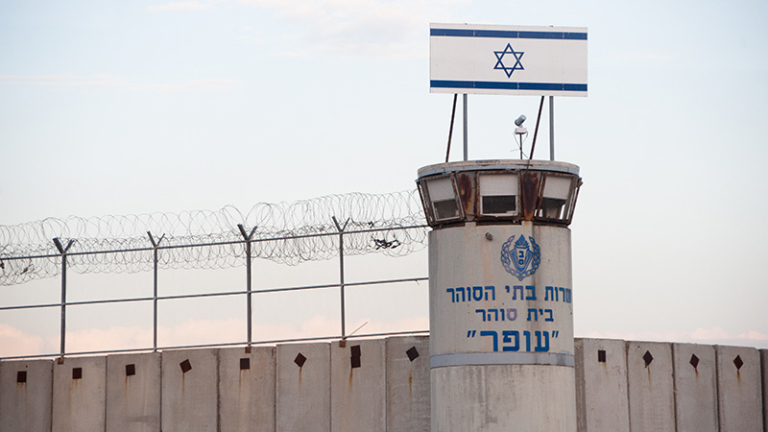
Israel’s policy of administrative detention, which is to say of military detention without charge or trial, rarely attracts mainstream media coverage in the West. To the extent that it is covered, it is usually only given airtime when individuals engage in a hunger strike in protest of their detention. While this coverage draws attention to the issue, it inevitably does so in a way that is framed by the individual’s case, and not by the broader struggle against this illegal and inhumane practice. Similarly, human rights organizations and advocacy groups typically raise awareness of administrative detention primarily through individual cases, and generally only the most striking ones.
This approach of focusing on highly visible and particularly egregious cases risks losing sight of the bigger picture: Israel’s use of administrative detention is a violation of international law and is used by the Israeli authorities as a systematic, foundational, and racialized tool in the suppression of Palestinian political organizing and resistance to occupation.
The Systematic Violation of Human Liberty
Administrative detention, as practiced in different contexts by a variety of state authorities around the world, is the detention of an individual without trial. The origins of its use in Israel lie in the period of the British Mandate for Palestine, and specifically in the Defense (Emergency) Regulations of 1945. The practice was subsequently incorporated into Israeli legislation and military orders, and has been used extensively against Palestinians since 1967.
Administrative detention is most widely used against Palestinians from the West Bank, where the Israeli regional military commander can issue detention orders for up to six months at a time. These orders are renewable, which means that a Palestinian’s detention without trial can be extended indefinitely. According to Israeli military orders, the regional Israeli commander must have “reasonable grounds to believe that a certain person must be held in detention for reasons to do with regional security or public security.” However, as British charity War on Want noted in a 2021 report, what constitutes regional or public security is “subject to the interpretation and whims of military commanders.”
Although administrative detention orders must be upheld by a military judge, only the judge is allowed to view classified evidence, which hinders the ability of defense lawyers for those being detained to mount a defense.
Although such orders must be upheld by a military judge, only the judge is allowed to view classified evidence, which hinders the ability of defense lawyers for those being detained to mount a defense. Should a Palestinian appeal make its way to Israel’s Supreme Court, it is all but guaranteed to be unsuccessful. Although in January 2022, the court made a highly unusual decision to reduce a prisoner’s administrative detention, a lawyer with the Association for Civil Rights in Israel said that such an act is practically unheard of.
As then UN Special Rapporteur Michael Lynk emphasized in 2020, international law stipulates that administrative detention is an emergency measure, and is not to be used regularly. In the context of a military occupation such as Israel has been conducting in the West Bank since 1967, Lynk stated that, “Article 78 of the Fourth Geneva Convention only permits an occupying power to employ administrative detention ‘for imperative reasons of security.’” It follows, then, that from an international legal perspective, Israel’s extensive and systematic use of administrative detention is illegal.
Although Palestinians from the West Bank constitute the overwhelming majority of administrative detainees, it is important to note that Israel also uses the practice on Palestinians who hold residency status in occupied East Jerusalem, and on Palestinians who hold Israeli citizenship. In particularly rare cases, Jewish Israelis are placed under administrative detention, but in the case of Jerusalem residents and Israeli citizens, the order must be signed by the Israeli Defense Minister, rather than be issued by a lower-ranking Israeli military official.
A Surge in 2022
A surge has occurred in 2022 in both the number of administrative detention orders issued by occupation authorities as well as the number of Palestinians being held in administrative detention. By mid-September 2022, Israeli authorities had issued 1,365 detention orders—more than 80 percent of 2021’s total—making it highly likely that this year’s total will constitute a marked increase over last year’s. The number of Palestinians being held in administrative detention reached 798 at the beginning of October 2022, whereas in 2021 that figure was around 500. And two years ago, in September 2020, the number was only around 340. On October 17, the Palestinian Prisoner’s Society released data showing that 1,610 Palestinians had been, at one point or another, placed in administrative detention in 2022. And the current number of detainees is the highest number since 2008.
Military Rule
It is impossible to analyze Israel’s use of administrative detention divorced from the wider context of its military occupation, its practice of colonial rule, and its repression of Palestinian political activity. This repression is intended to sabotage and thwart Palestinian political mobilization and activism, and involves Israel’s criminalization of civil society organizations. According to a Human Rights Watch report, “Since 1967, the Israeli Defense Ministry has banned more than 411 organizations, among them all major Palestinian political parties.”
The number of Palestinians being held in administrative detention reached 798 at the beginning of October 2022, whereas in 2021 that figure was around 500. And two years ago, in September 2020, the number was only around 340.
The Israeli army also uses military orders as a means of political repression, such as Military Order 1651, which includes a 10-year sentence for any person who “attempts, orally or otherwise, to influence public opinion in the Area [the West Bank] in a manner which may harm public peace or public order,” or who “publishes words of praise, sympathy or support for a hostile organization, its actions or objectives.” The vague wording here is intentional, and was clearly written to allow Israeli authorities to interpret the order as they wish so as to arrest and imprison Palestinians under occupation.
A more recent example of political repression through proscription is the criminalization of major human rights and civil society NGOs such as Al-Haq and Addameer, both of which have become subject to the very Israeli human rights violations that they have documented for decades.
Administrative Detention as Political Repression
Israel’s use of administrative detention as a tool of political repression is evident in the fact that the number of administrative detainees over the past decade typically correlates with spikes in Palestinian political mobilization and resistance. From 2010 to mid-2014, the monthly number of detainees was relatively low, rarely reaching 300. Since then, however, the data tell a different story.
The summer of 2014 saw three significant interrelated events: wide-ranging and often deadly Israeli raids across the West Bank following the killing of three Israeli teenagers, a wave of unrest in Palestinian neighborhoods in occupied East Jerusalem after the killing of Palestinian Mohammed Abu Khdeir, and a devastating, 50-day-long Israeli offensive on the Gaza Strip. In late 2014, the number of administrative detainees rose to 500. The use of administrative detention rose again in late 2015, and reached 700 in 2016 as a wave of Palestinian attacks took place targeting soldiers and settlers in Jerusalem and the West Bank.
Administrative detention is used against Palestinians from diverse backgrounds that cut across Palestinian society, including both old and young men and women, university students, community activists, politicians, journalists, lawyers, and others.
Administrative detention is used against Palestinians from diverse backgrounds that cut across Palestinian society, including both old and young men and women, university students, community activists, politicians, journalists, lawyers, and others. The common denominator here is the Israeli occupation authorities’ claim that a given individual is involved in illegitimate or illegal political activity, with these terms being loosely defined by the authorities’ military orders and proscriptions. On May 12, 2021, for example, during that month’s Unity Uprising, almost 60 Palestinians, including political and civil society leaders and journalists, had their homes raided and were arrested. Many of them had previously been held as political prisoners.
The vast range of Palestinians placed in administrative detention is illustrated by two particularly egregious examples. The oldest known administrative detainee is 80-year-old retired lawyer Bashir Khairi, who has a history of political organizing within the Popular Front for the Liberation of Palestine. Israeli forces arrested Khairi on October 29, 2021, and on December 7 of that year issued him a six-month administrative detention order. On April 28, 2022, the Israeli military commander renewed the order, which is scheduled to end on October 27.
Meanwhile, 17-year-old Amal Nakhleh was detained by Israeli occupation forces at his home in al-Jalazun refugee camp near Ramallah on January 21, 2021. Despite his age and the fact that he suffers from the autoimmune disease myasthenia gravis, Israeli authorities kept Nakhleh in administrative detention for 481 days. During that time, his detention was renewed three separate times. And during his detention, Israel’s intelligence agency Shin Bet reportedly told him that he would be freed if he agreed to become a collaborator. These two cases demonstrate both the breadth of Israel’s use of administrative detention and its disregard for the health and wellbeing of those it detains.
Resistance
Palestinians have a long history of practicing resistance to Israel’s carceral policies, and administrative detention is no exception. Hunger strikes have been at the forefront of resistance efforts over the last decade, including those staged by Khalil Awawdeh (182 days), Hisham Abu Hawash (141 days), Maher al-Akhras (103 days), Samer Issawi (266 days), Hana Shalabi (43 days), and Khader Adnan (66 days).
As Israel’s use of administrative detention has surged, Palestinians have started undertaking collective forms of protest and refusal. On January 1, 2022, nearly all Palestinian administrative detainees began a collective boycott of military court procedures in protest of their lack of due process.
As Israel’s use of administrative detention has surged, Palestinians have started undertaking collective forms of protest and refusal. On January 1, 2022, nearly all Palestinian administrative detainees began a collective boycott of military court procedures in protest of their lack of due process. The boycott is intended to highlight the inherent injustice of the military court process, wherein detainees remain ultimately powerless witnesses to their own judicial abuse. The fact that hearings have proceeded regardless of the boycott and without the detainees’ presence makes clear that such hearings are essentially arbitrary, and that the Israeli authorities will make their decisions regardless of circumstance and argument.
And in September 2022, a group of 30 Palestinian detainees initiated a collective hunger strike in protest of their administrative detention and were later joined by 20 other prisoners. The group suspended its hunger strike after 19 days after reaching an agreement with Israeli occupation authorities to release sick and elderly detainees and to prioritize the matter of administrative detention in talks with representatives of the Palestinian Prisoners’ Movement.
Racism in the Context of Apartheid
The documentation of Israel’s use of administrative detention demonstrates that the practice is being pursued well beyond the limited scope that is granted an occupying power. As such, it can and should be exposed and opposed, including in international coverage, as an illegal practice of systematic and arbitrary detention. But given Israeli authorities’ use of administrative detention without charge or trial as a tool of political repression and persecution, opposition to the practice should go even further than it already has.
The fact that the vast majority of administrative detainees are Palestinians and that the practice is almost never used on Jewish Israelis adds a racialized dimension to Israel’s administrative detention. Given that its use of the practice is longstanding, widespread, and continues to escalate, Israel’s administrative detention of Palestinians should be afforded due attention by policymakers and campaigners alike. Moreover, it should be recognized as a crucial element in a system that suppresses Palestinian political activity and maintains Israel’s apartheid status quo.

